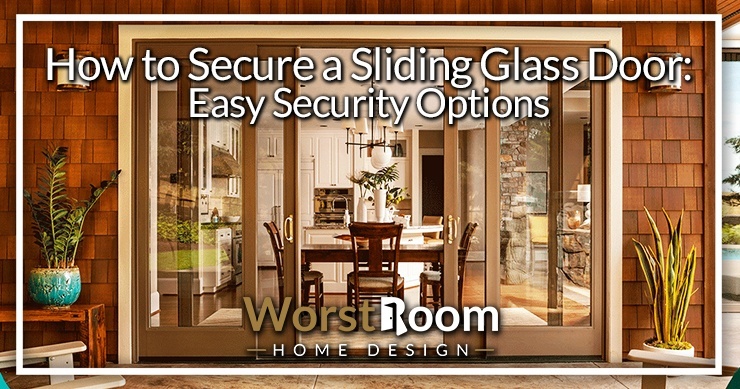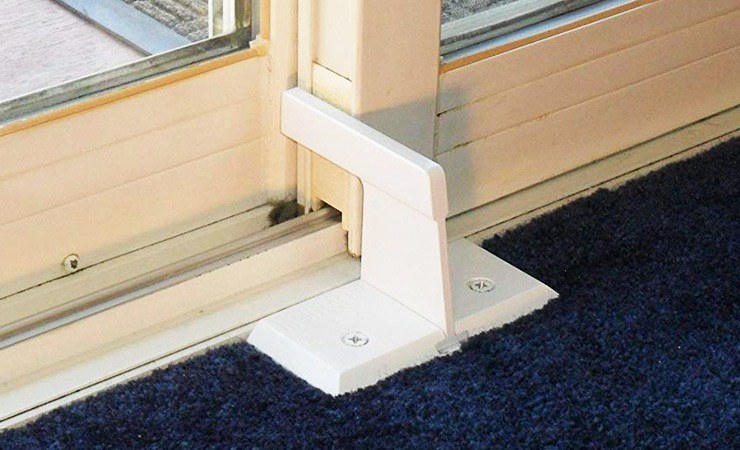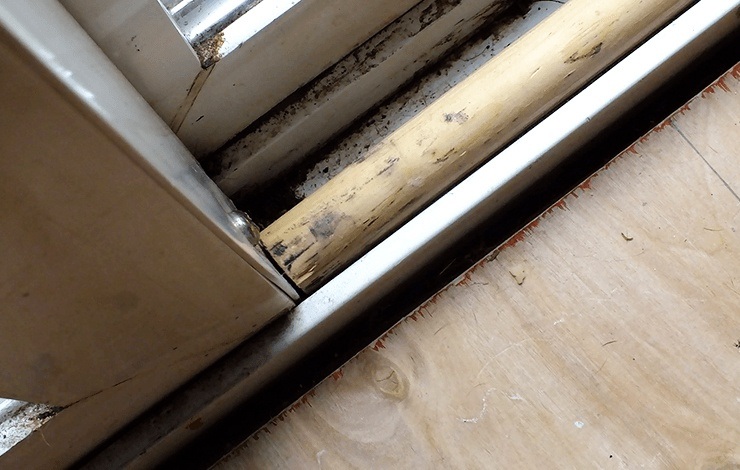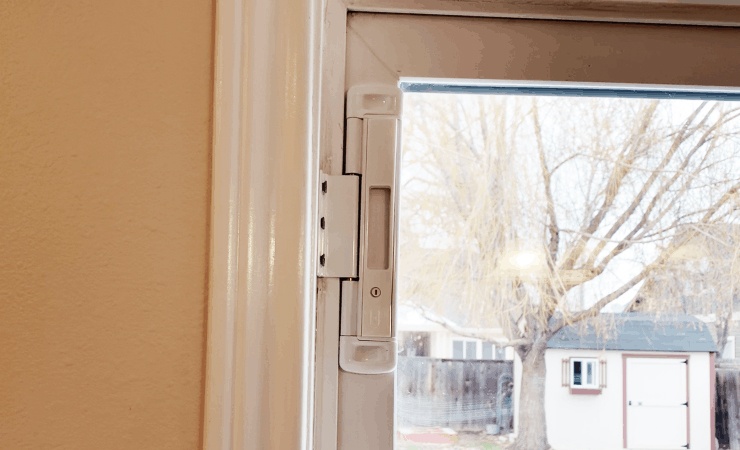How to Secure a Sliding Glass Door: Easy Security Options
Author: Rick Worst | Editor: Omar Alonso
Review & Research: Jen Worst & Chris Miller

It's not paranoid to wonder if your sliding glass door is safe. You engage their tiny locks, maybe you throw a broom stick into the track, or even have unbreakable glass.
But as you keep thinking about it, you find more vulnerabilities, like lifting the door out of the track entirely. Fear not. I'm going to tell you how to secure a sliding glass door.
You're not wrong to be worried about this, not by a long shot. Home security is a big deal and these doors feel like one of the most over-looked items where we trade security for convenience.
They're safe against weather and animals, but it's the crafty human burglars we're more concerned about.
Most of the security features on these entry points are just deterrents. They exist to create little barriers that might cause too much noise to break into, hoping that a thief will simply choose another target that requires less effort.
But that's rarely the case, because most of the time the target is locked for one reason or another. So let's look at the reinforcement options available.
Glass Door Security Options
When you boil it down, there's really only about four glass door security options available that can be added on the typical, pre-built and pre-installed door. Let's take a look at those, in no particular order.
Install a Security Bar
You've likely seen someone use this method because it's so simple. There's a few ways to go about using a security bar or barricade, but the point is the same, which is to stop the door from sliding open in the event that the lock fails or slips down.
If you want to get real fancy, you can buy baseplates that bolt into your flooring and then a metal rail is slid forward to block the door. In my opinion, these aren't a great choice.
They cost more, they require you to drill into your floor, and the metal can be bent. Take a look at this picture and you'll understand what I mean:

These might look cool, but they could bend or the screws could be torn out of your flooring. A better idea is to use an extendable rod of some sort.
My favorite method is to simply cut a thick dowel rod to the perfect length where it can lay in the track so the door can't slide. Check that out below:

There is zero chance a dowel like this breaks, since the direction of the force is applied when trying to open the door pushes down the full length of the wood. These can be better but less convenient than many of the types of sliding glass door locks out there.
Even if you have a lock that you trust, I believe this is a fundamental method in how to protect sliding glass doors from burglars.
You should be using this method, no matter what. You can get a dowel at your local Home Depot or Lowes and even have them cut it to the right length for you for less than two dollars.
I should mention that some sliding glass doors come with one of these horizontal blocking bars built in, attached about halfway up the door.
They're built to swing down into place, but the problem with these is these hinges wear out easily and the bar itself is hollow, cheap aluminum most of the time.
I've yet to see one that didn't break at the hinge or bend in half due to being hollow and made of soft metal. Don't trust those to secure your home.
Reinforce the Glass Door Itself
What I mean by this is that you now need to consider how to deal with a burglar who would show enough bravado to simply break the glass and walk on in. Modern sliding glass doors will often come with shatterproof, unbreakable glass that's often double pane.
But not all of us have the luxury of going out and buying a new door and then paying to have it installed. Construction ain't cheap!
The thing to understand is that about thieves is their main concerns are making as little noise as possible, and in the case they do have to make noise they want to get in and out as fast as they can.
For those of us with older sliding doors that can't afford to buy a new one, there's such a thing as "sliding glass door security film."
The main purpose of this window film is to hold the glass together if it gets broken. That means if a burglar starts bashing at the glass door, they have to keep bashing and make even more noise and increase the amount of time it takes them to "smash and grab."
It interferes with their two main goals mentioned above, which is to break in and get out as fast as they can while making as little noise as possible.
Check out the BDF S8MC Window Security Film as a good option (take care to look at the measurements offered). It comes in rolls and you'll cut it to size.
You can get a smaller width and use two pieces to cover your door, or get a wider roll so you don't have a seam. If you really want to up the ante, you can cover both sides of the glass too.
When someone smashes at the glass, instead of it breaking, the result is the classic spider-webbing out from the point of impact:

This is a good time to mention that you can get this kind of security film that also acts as adds a haze over the glass to blur the vision of the person looking in. The problem is that it does the same for you looking out, which kind of defeats the purpose, and diffuses natural light.
A better solution to reduce bad guys creeping around and looking in is to use the types of blinds and curtains that reach from the top of the sliding glass door to the floor when you're not home.
Some of these films can even reinforce double glazed and thermal break doors and have low-emissivity coatings to help reduce your power bill.
Add a Lock That's Not Worthless
We all know that the types of door locks on sliding glass doors are typically worthless. Admittedly, when I was renting apartments I had one that felt very solid, but that was the only one out of what must be a hundred different sliding doors I've encountered.
Locks are a great way to secure a sliding glass door, but you have to add ones that don't suck.
There are some cool DIY locks that are easy to install, faster to use than a dowel (though I'd probably use both), and look and feel more sophisticated than a dowel rod. There are two main types of these locks out there, both acting more like a dead bolt.
The first is a kind that adds a bolt to the door itself that you then slide up into a receptor installed on the top of the door's frame.
It's only installed on top to keep you from having to bend over, but you very well could place one on the bottom or both the top and bottom, though that's not going to be necessary.
The one that I prefer is installed on the side of the door, preferably around the middle of the height of the door, and install the receiver on the frame at the same height. The lock itself features two bolts that then slide up and down into the receiver. They're easy to install, quick to use, and resists up to 1,000 pounds of sliding force.

If you recall above, I mentioned the one thing most people forget to defend from with their doorwall, which is the bad guy simply lifting the door out of the tracks and setting it aside. This second type of lock also defends from this type of attack.
Another option are what are called a "patio door pin." You may have seen them dangling from a little chain. It's just a metal pin that slips through the door and into the frame, which is meant to act as a lock and a deterrent to lifting the door out of the track.
I'm not convinced these are that great. They're just another way to create a minor annoyance for the bad guy. Some people even like locks with types of keys on these but the inconvenience is purposeless when the glass can just be busted.
Monitored Home Alarm System
I feel like I should mention this, though it's kind of obvious. Having a professionally installed home security system is always nice. But then you can talk about thieves cutting the power to the house, etc. Nothing is fool-proof and cutting the power isn't likely to happen.
But if you can't afford to actually have a security system, purchasing a fake security sticker to place on your sliding glass door that claims you're protected is still a smart move.
That might be enough to make them go try to find a different house to rob, because the risk is too high at your house.
Another option is to install fake cameras outside, aimed at your sliding door. Of course it's better if they actually work but a decoy is definitely better than nothing. There are some battery-powered options so a blinking red light will draw attention to them.
Security for Sliding Doors is Easy
If I had to summarize the topic of sliding patio door security, I'd tell you to add shatter-resistant security film to the glass itself, get a dowel cut to lay in the track, and add a double bolt sliding door lock as mentioned just above.
With those three things, it will take far too long and be far too noisy for any thief to consider breaking in your door. You can also consider installing sliding glass door alternatives, too.
And of course, if you can afford it, having a security system in place will run them off almost immediately. Now that you know how to secure a sliding glass door, the only thing left is to do it so you can feel safe in your own home.
It's worth it just for the peace of mind, let alone in the event of a real break-in.



